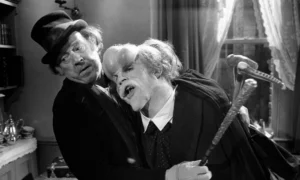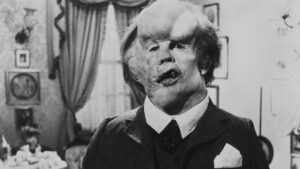The Elephant Man (1980) review
Dir. David Lynch
By: Steve Pulaski
Rating: ★★★½
 Remembering David Lynch
Remembering David Lynch 
 1946 – 2025
1946 – 2025 
With The Elephant Man, David Lynch has crafted a biopic by way of Hammer Horror films such as The Mummy and The Wolf Man, and the result is nightmare-inducing and truly terrifying.
Using carefully orchestrated techniques to inspire fear while illustrating a very particular mood and technique, Lynch and cinematographer Freddie Francis successfully allow The Elephant Man to take on the look and feel of a film much older and different than what it really is. Summoned from the story of Joseph Merrick, a man from the 1880s that became an infamous sideshow attraction due to his severe facial and skeletal deformities, Lynch and co-writers Eric Bergren and Christopher De Vore work off of Frederick Treves’s novel The Elephant Man and Other Reminiscences (1923) and Ashley Montagu’s companion work The Elephant Man: A Study in Human Dignity (1971) in order to create one of the most admirably haunting yet inspiring biopics in existence.
The film turns Joseph Merrick into John Merrick, played by John Hurt under layers of prosthetics so dense and believable it motivated the Academy Awards to create a category specifically to honor such achievements. John, who is known as “The Elephant Man” due to his enlarged hands, protruding skull, and oddly canted torso, lives his life mostly in disgrace for the amusement of others as a circus freak. The course of his life reverses once he meets Frederick Treves (Anthony Hopkins), a local London surgeon who takes John out of the circus and into his private hospital in order to study his deformities and try to come to a conclusion how and why he was born with such hideous features.
Because of the immensity and weight of John’s skull, he must sleep sitting up, and ordinarily exits the house wearing a custom-made hat and hood combo so as not to evoke fear or judgement from passersby. Throughout his entire life, John has grown tragically accustomed to the empty scrutiny he gets for attributes he cannot control. This is why he takes the kindness and humanity of Treves so seriously in addition to that of Madge Kendal (Anne Bancroft), an actress who introduces him to the escapist entertainment and intellectual benefits of the theater and William Shakespeare.

The trifecta of great acting here acts as a tentpole for the entire film in conjunction with the cinematography. The performances of the mannered and riveting Hopkins, the brilliantly conceived Hurt, and the irreplaceable savior Bancroft elevate the film to being a consistently immersing experience simply for the acting. The actors are cloaked in grainy black-and-white that makes one feel they’re watching an old horror film on a television with rabbit ears in the wee hours of the morning, and such a visual style gives the film that aforementioned Hammer Horror film quality that makes it all too consuming at times.
Lynch has always been better at inspiring mood and creating an atmosphere than he has at creating characters, but part of the reason The Elephant Man is successful at doing the latter in addition to the former is likely because of source material. Although predictably dramatized during the nonetheless harrowing sequences of abuse and torment John experiences from townspeople, Lynch develops his characters in a way that makes them more than historical details to a larger story. He gives Treves a very passionate edge, showing him as a man motivated by compassion and dignity rather than selfish impulses and a savior complex. The same can be said about Bancroft’s Madge, who is tender, even affectionate in a platonic sense, when she interacts with John. Then there’s John, who works through speech therapy and social situations with Treves by his side in order to try and not only become more confident, but more importantly, more accepted and embraced in a society that ostensibly wants nothing to do with him.
The Elephant Man is a story told with impressive human interest, despite occasionally opting for a more linear plea to treat everyone as human beings – something that is a bit too conventional, and dare I say, pandering to the masses for Lynch. But one thing Lynch doesn’t do here is sellout. He never allows the potential preachiness of the story to undermine or outweigh the gravity of his aesthetics and his characters, nor does he let one smother or restrain the other. His sharp focus and camera positions with Francis’ keen eye for detail that echoes film noir, classic monster movies, and even lost films make this film just as much a technical marvel as it does a narrative success.
This is not an easy sit, mind you. On a regular basis, this film can be quite troubling, and the moody atmosphere only makes the film more haunting and uncomfortable. However, a film demanding us to redirect our baseless critiques and the unfounded judgements we reserve for people we meet ultimately must, in my mind, show the contemptible actions and abuse that can and often inspire from such. Lynch doesn’t skimp on that, and Francis ultimately doesn’t hold back from portraying it as it is – a living, breathing nightmare of an experience.
My review of The Grandmother (1970)
My review of Eraserhead
My review of Dune (1984)
My review of Blue Velvet
My review of Mulholland Drive
Starring: Anthony Hopkins, John Hurt, and Anne Bancroft. Directed by: David Lynch.
About Steve Pulaski
Steve Pulaski has been reviewing movies since 2009 for a barrage of different outlets. He graduated North Central College in 2018 and currently works as an on-air radio personality. He also hosts a weekly movie podcast called "Sleepless with Steve," dedicated to film and the film industry, on his YouTube channel. In addition to writing, he's a die-hard Chicago Bears fan and has two cats, appropriately named Siskel and Ebert!


